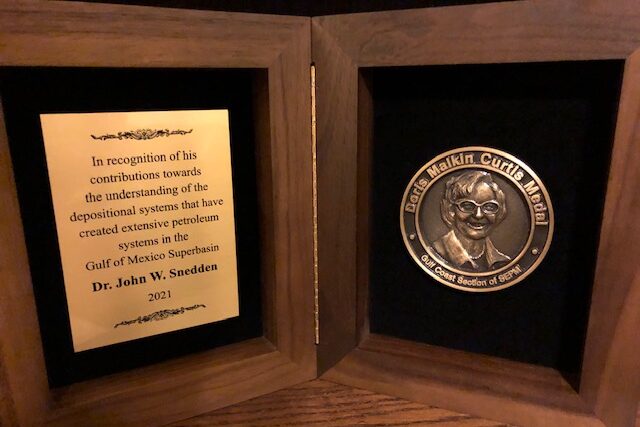
John Snedden, a senior research scientist at the University of Texas Institute for Geophysics (UTIG), has been awarded the Doris Malkin Curtis Medal by the Gulf Coast Section of the Society for Sedimentary Geology (SEPM).
The award recognizes Snedden’s numerous contributions to the study of the Gulf of Mexico and the geology that sets it apart as a superbasin. The medal is the Gulf Coast Section’s highest honor and is the fifth to be awarded to a geoscientist at The University of Texas at Austin (UT).
Snedden said he was surprised and gratified to receive the award.
“My sincere thanks to the society’s leadership and members, and to Michael Sweet who composed the biography,” he said.
The Gulf Coast SEPM’s medal was established in 2007 in honor of Doris Malkin Curtis, a pioneering scientist who worked on the Gulf of Mexico for over fifty years. The medal recognizes career contributions to the understanding of the geology of this and other important basins.
Snedden directs the Gulf Basin Depositional Synthesis project, a long running, industry-funded research project at UTIG. He and the GBDS team have produced hundreds of geologic maps and numerous reports and papers on the basin sandstone, shale, and salt layers and its prolific hydrocarbon reservoirs, seals, and source rocks.
UTIG Director Demian Saffer said that Snedden’s contributions had proven themselves a rich resource for industry and academic geologists alike.
“The medal is richly-deserved recognition of John’s sustained foundational contributions to understanding the processes and patterns of sediment transport in the Gulf, as well as the role he has played in mentoring students and postdoctoral scholars as part of the GBDS program,” he said.
In particular, Saffer highlighted Snedden’s recent work characterizing the complex geology of the Gulf’s southern deepwater region. The work has helped characterize untapped offshore petroleum deposits that could fuel the U.S. and Mexico as they transition to low carbon energy sources.

In December 2020, Snedden published research laying out definitively the critical factors that support the Gulf of Mexico’s status as a modern superbasin — one of a small number of prolific geologic basins that supply the bulk of the world’s oil and gas. The study traced the Gulf’s geologic history, from its formation among the fragments of Pangaea, to the ancient salt flats and sediment flows that created the vast energy reserves powering the U.S. today. According to Snedden, deepwater reserves could become increasingly important during the energy transition because, among other advantages, they produce significantly less flaring — the practice of burning excess gas at the wellhead — than onshore wells. The story is told in greater detail in Snedden’s book, The Gulf of Mexico Sedimentary Basin, which he published in 2019 alongside UTIG Professor Emeritus William Galloway, who was also the 2012 Doris Malkin Curtis Medal recipient.
Other UT recipients of the medal include the Bureau of Economic Geology’s Leonard “Frank” Brown and Shirley Dutton, and UTIG and bureau alum Charles Winker.
Snedden worked as an exploration and research geologist at Mobil and ExxonMobil for over three decades before joining UTIG in 2011 to lead the GBDS project. UTIG and the BEG are units of UT Jackson School of Geosciences.
